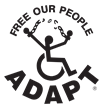
By Jake Johnson
Common Dreams (7/28/17)
Following the Senate’s vote on Friday that dealt a crushing blow to the GOP’s hopes of repealing Obamacare, major media outlets, Democratic lawmakers, and high-profile pundits singled out Sen. John McCain’s (R-Ariz.) vote against the so-called “skinny repeal” measure as the decisive factor in its downfall. But many are objecting strongly to this narrative: It is disability rights activists across the country who deserve credit, commentators argued, not a lone senator.
“If you want to thank someone” for Trumpcare’s demise, wrote freelance journalist Paul Blest, “thank ADAPT and…constituents who raised hell about this. Don’t praise power.”
“Folks praising Murkowski, Collins, and McCain: I think you misspelled Hirono, ADAPT, and every activist resisting the Republican agenda.”
ADAPT is a national organization that engages in nonviolent civil disobedience to protect the rights of the disabled. Throughout the Trumpcare fight, ADAPT activists played a central role; for weeks they occupied Senate offices overnight, faced arrest, and in some cases endured harsh treatment from law enforcement to highlight the devastating effects Trumpcare would have on America’s most vulnerable.
Last month, as Vox‘s Jeff Stein reported, as many as 50 ADAPT protestors were arrested in a day, and their efforts continued throughout the build-up to Friday’s vote.
In an interview on Democracy Now! Thursday, Stephanie Woodward, an organizer with ADAPT, described the mass civil disobedience activists carried out earlier this week.
“I was arrested with about 64 of my lovely ADAPT warrior siblings as we were all chanting that we would rather go to jail than die without Medicaid, because we know that people with disabilities will, quite literally, die with these Medicaid cuts,” Woodward said.
It is the persistence of Woodward and thousands of others—not the votes of a handful of senators—that deserves to be at the center of attention, many argued following Trumpcare’s collapse.
They travelled to D.C.
They slept outside in wheelchairs.
They were arrested.
They never lost faith.
They saved Medicaid. @NationalADAPT
(This work is licensed under a Creative Commons Attribution-Share Alike 3.0 License.)
*****
Disabled & Disobedient: How ADAPT Activists Blocked The GOP Healthcare Bill
By S.E. Smith
In These Times (7/28/17)
DENVER—At 7 p.m. on June 29, Republican Sen. Cory Gardner’s office resembles a middle-school sleepover, blankets and snacks scattered across the floor. Only the jaunty flag dangling from the wall exposes the scene for what it really is. “Our Homes, Not Nursing Homes,” it reads. Disability-rights activists with ADAPT are worried the GOP’s proposed cuts to Medicaid could force them into institutions by slashing support for home- and community-based services. This is a sit-in.
After nearly 60 hours, a phalanx of police officers appears in the doorway, zip ties in hand. The disability rights activists on the floor begin to chant: “Rather go to jail than die without Medicaid.”
Moments later, a slow procession out of the office begins, police awkwardly maneuvering wheelchairs. Cameras crowd around, broadcasting images around the world.
To call back ACT UP’s famous slogan: Silence equals death.
The national media started paying attention to the disability rights group ADAPT in June, when chapters organized protests at offices of GOP senators across the country, from Alaska to Ohio to Florida. But this is not ADAPT’s first rodeo. It is more like another day at the office.
When ADAPT activist Carrie Ann Lucas declined to assist Denver officers with the operation of her wheelchair, she was arrested and charged with interference with police. She was quickly released, however, because sheriff’s department personnel were worried about handling her ventilator. “I feel a little bit discriminated against,” she tells In These Times, “that I didn’t get to enjoy the fine accommodations of the sheriff’s department with everyone else.” For Lucas, this form of protest taps into a long and deep tradition. “We are persistent, and we were going to persist,” she says.
Fittingly, ADAPT’s work started in Denver, in 1978, when the group, then called Atlantis, blocked city buses to demand accessible transit. Nine years after Atlantis roared onto the scene, another group of loud, rowdy activists arose: the AIDS Coalition to Unleash Power, aka ACT UP. Both groups laid their bodies on the line to stress the life-and-death stakes of healthcare policy. ADAPT made global headlines in 1990 when disabled people crawled up the steps of the Capitol Building to fight for the Americans with Disabilities Act; in 1992, ACT UP members swarmed the White House lawn to dump ashes of deceased loved ones, saying, “If you won’t come to the funeral, we’ll bring the funeral to you.”
Members of both organizations are well aware of the power of shock value, knowing that a picture of a wheelchair user raising her fists in the air as she’s lifted into a police van, or an HIV activist chained to a fence, makes for a compelling call to action. Over the decades, the groups have shut down the White House, closed government buildings and infuriated a lot of people in power. …
- We Need Each Other: Why People with Disabilities Should Defend the Rights of Care Workers – The word “companion” doesn’t sound oppressive at all: It appears quite the opposite. A companion is supportive, nurturing, loyal. But that word was used for decades to deny basic labor protections to workers who provide in-home assistance to people with disabilities. I use a motorized wheelchair, and I employ a crew of workers to assist me in my home in Chicago. I call them my pit crew. They help me with everything, from dressing and bathing to running errands. I hire, fire, schedule and supervise them, and their wage of $13 per hour is paid through a state program called Home Services that is primarily funded by Medicaid. So, the help I receive costs me nothing. It’s vitally important to me. Without it I would be stuck in a miserable nursing home. … Read the Rest
ADAPT – Free Our People!
Learn More
